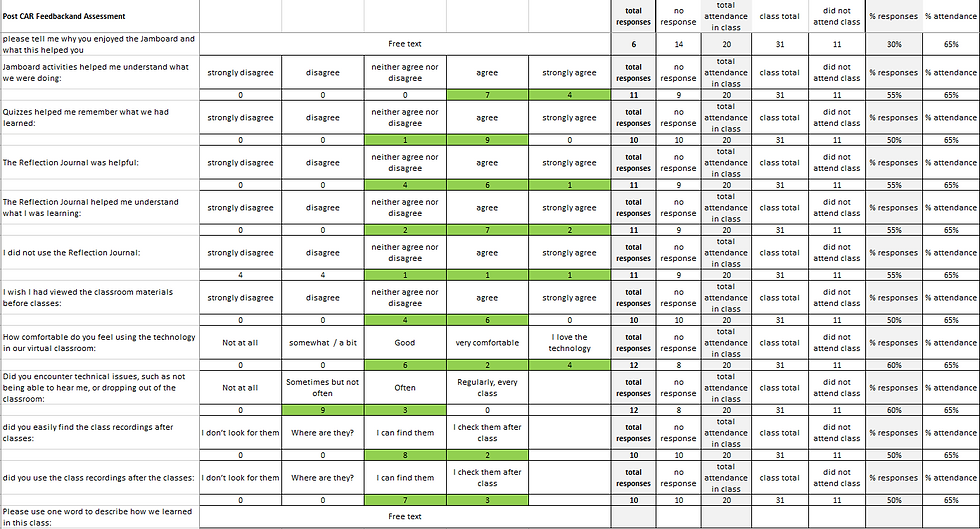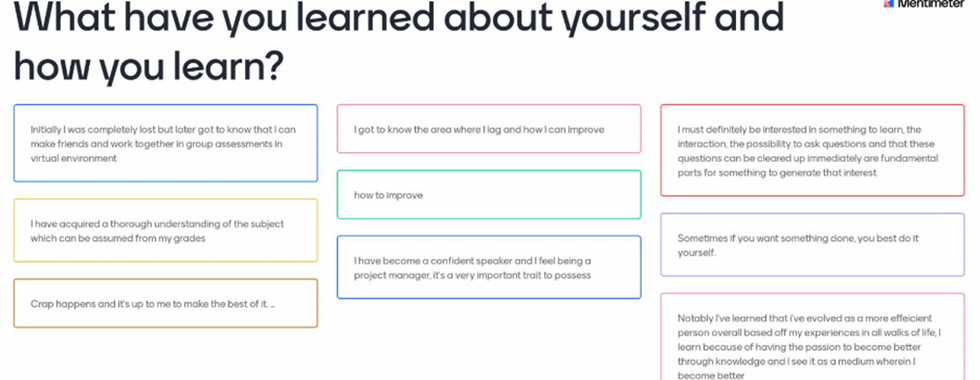Student Engagement : Classroom Action Research Analysis
- Krys

- Dec 10, 2020
- 3 min read
Overview
Analysis was undertaken via qualitative feedback, collected using Mentimeter, posing questions which allowed for open-ended responses as well as selections of responses via a Likert scale. The slides and responses were shared and were therefore immediately available for all students. I found that this encouraged greater participation, however as the post-intervention feedback process continued, the number of responses was reduced. Overall, the responses provided an assessment of student satisfaction with the LTA, and a few students readily admitted to not having taken advantage of all of the opportunities. Further analysis identifies the difficulties with applying causation between the LTA and Academic Outcomes and provides recommendations for future research.
Data and Evidence
Pre-Intervention
Student pre-intervention feedback was gathered in Week 4 of the trimester, by which time the class attendance had begun to settle. In this trimester, there was a considerable level of confusion, as students were swapped between classes until week 4. Overall, three students have not participated in class activities or submitted assessments. A further number of students did not regularly attend classes, however 3 of these students had notified me of the reasons, and reviewed class materials, Jamboard outcomes and class recordings, communicating via their Reflection Journal or email.
Pre-intervention feedback was gathered to understand the student cohort, their learning preferences, and their background understanding of Project Management. These details provided the background and context to the research, noted previously. Full details can be found below with samples of responses in graphic format to follow. Outcomes provided a basis on which to develop LTA. Most students claimed to have a knowledge or some experience of Project Management. Preferred learning styles were also assessed, to develop an understanding of the level of change required for students. Most students noted that learning and remembering, and learning via lectures was their previous experience, however group work and group assignments, in class presentations and discussions were mainly preferred. A small number of students indicated their preference for lectures and taking notes. Students generally, however, indicated their preparedness for the collaborative style of LTA proposed for this research.
Pre CAR assessment

Post-intervention
Student post-intervention feedback was gathered in Week 11, one week following the final intervention, and in the class immediately prior to the final assessment submission. The interventions cannot be considered a predictor of improved grades for this class cohort, though a comparison of final grades for each student has indicated an improvement in Academic Outcomes when compared to the previous class.
Feedback, however, can only provide the student experience, and their interpretation of the value and success of the intervention activities. The feedback was qualitative in nature and consisted of open-ended questions with the use of a Likert Scale (Joshi, Kale, Chandel & Pal, 2015), Noting that qualitative surveys represent the opinions of the respondents (Farrell, 2016), feedback gathered should only be seen as representative of the participants who chose to respond. Post intervention responses and graphic representations of responses can be found below.



Investigating student feedback regarding the value and effectiveness of the LTA, provides an indicator of student satisfaction, but cannot be correlated directly with Academic Success. Social Constructivism theory, including the principle of self-directed learning, and Vygotsky’s Zone of Proximal Development (Verenikina, 2003; McLeod, 2019) supports peer learning and social collaboration. Student responses support the positive impact of the social learning environment. A sample of student responses is presented. Students also identified difficulties that they encountered within the Small Group Activities.
The overwhelming concern with other student participation, when discussing difficulties, could be reflective of the benefits and challenges of the social learning environment. While students appreciated the social learning, they found frustration and difficulties when other students did not participate.
The final summative AT was a group report, and several students reported, via their Group Contribution Reports, that other team members had not contributed effectively or at all, again confirming challenges working within a social learning environment.










































Comments